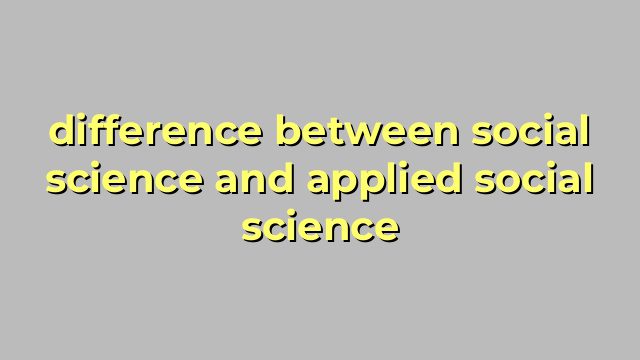Difference between Social Science and Applied Social Science
Social science and applied social science are two terms that are often used interchangeably, leading to confusion about their differences. While they share similarities in their focus on social behavior and how it impacts society, there are significant differences between the two fields.
What is Social Science?
Social science is a broad term used to encompass several fields of study, including sociology, psychology, anthropology, political science, and economics, among others. These fields focus on studying human behavior and social interactions to understand society’s dynamics and the factors that influence social structures and systems.
Social scientists use various research methods to gather data, such as surveys, interviews, and observational studies, to analyze and understand complex social phenomena. The findings are then used to develop insights into various social issues, such as poverty, inequality, and social justice, among others.
What is Applied Social Science?
Applied social science, on the other hand, is the practical application of social science theories and principles to address real-world problems. While social science aims to understand social behavior, applied social science uses this knowledge to develop effective solutions that can improve people’s lives.
Applied social science professionals use a range of techniques to address social issues, such as program evaluations, policy analysis, community development, and public administration. These efforts help improve social programs, service delivery, economic development, and other areas where social science principles can be applied.
The Difference between Social Science and Applied Social Science
While both social science and applied social science share a common focus on human behavior and social dynamics, the difference between the two lies in their approach. Social science is an academic field of study that seeks to understand social behavior and the factors that influence it. In contrast, applied social science takes the knowledge of social science and applies it in practical ways to help solve social problems.
Another significant difference is the career path for professionals in both fields. Social science graduates often pursue careers in academic and research settings, while applied social science graduates are likely to work in practical fields such as public policy, social work, public health, and community development.
Conclusion
In summary, social science and applied social science are two related fields that differ in their approach and career paths. While social science focuses on understanding social behavior, applied social science aims to use the knowledge to address social problems and improve people’s lives. Both fields are critical in creating a better understanding of social issues and devising effective solutions to address them.
Table difference between social science and applied social science
| Social Science | Applied Social Science | |
|---|---|---|
| Definition | It is a branch of science that deals with the study of human society and social relationships, including the behavior of individuals and groups. | It is a branch of social science that applies theory, research, and practical knowledge to solve real-world problems and improve the quality of life of individuals or communities. |
| Focus | The focus is on theoretical and academic study of social phenomena. | The focus is on the practical application of social science theories to address specific problems and issues. |
| Methods | It uses a variety of methods, including qualitative and quantitative research methods, to understand human behavior and social phenomena. | It uses a variety of methods, including research and evaluation of programs, policies, and interventions to solve real-world problems and improve the lives of individuals and communities. |
| Examples | Economics, psychology, anthropology, sociology, political science. | Social work, public health, education, criminal justice, urban planning. |
